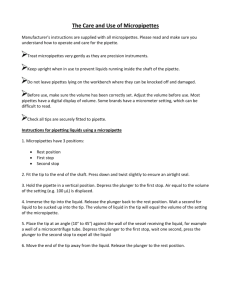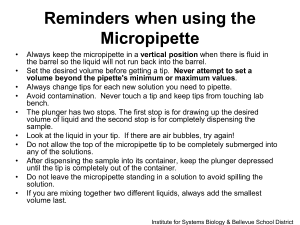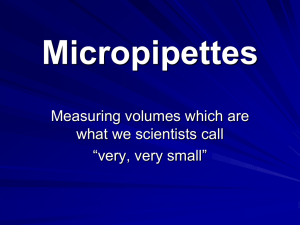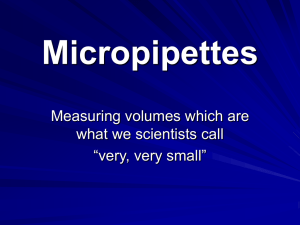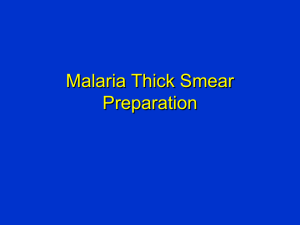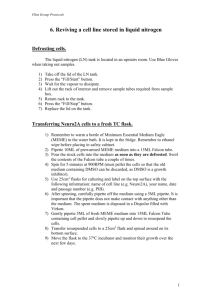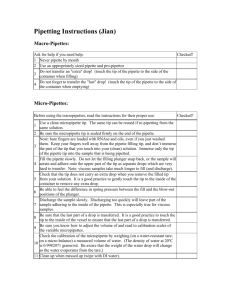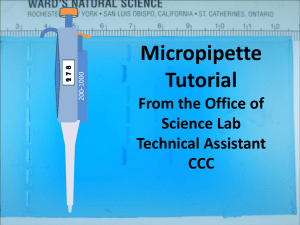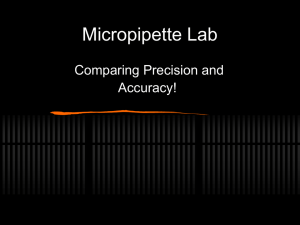Roberta,
advertisement
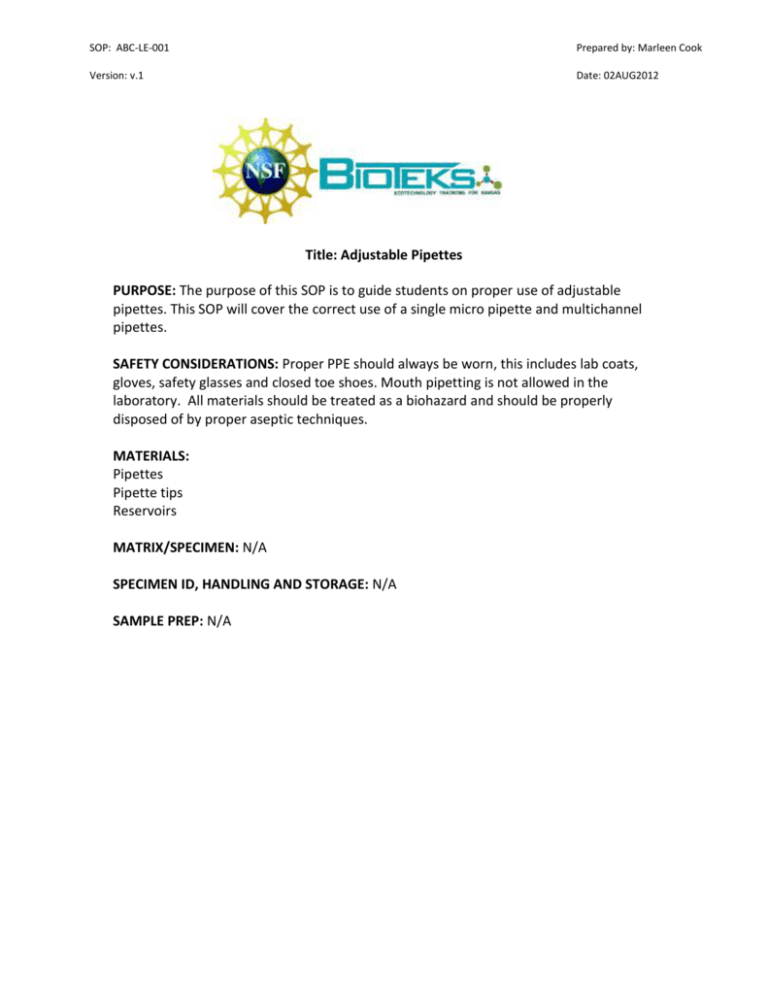
SOP: ABC-LE-001 Prepared by: Marleen Cook Version: v.1 Date: 02AUG2012 Title: Adjustable Pipettes PURPOSE: The purpose of this SOP is to guide students on proper use of adjustable pipettes. This SOP will cover the correct use of a single micro pipette and multichannel pipettes. SAFETY CONSIDERATIONS: Proper PPE should always be worn, this includes lab coats, gloves, safety glasses and closed toe shoes. Mouth pipetting is not allowed in the laboratory. All materials should be treated as a biohazard and should be properly disposed of by proper aseptic techniques. MATERIALS: Pipettes Pipette tips Reservoirs MATRIX/SPECIMEN: N/A SPECIMEN ID, HANDLING AND STORAGE: N/A SAMPLE PREP: N/A PROCEDURE: Single Pipettes 1. Insure the pipette is clean of any reagents/residues in order to avoid contamination. 2. Adjust the pipette volume by altering the dial to show the desired volume in the volume readout window. Example: P2 P10 P20 P100 P200 P1000 1 0 1 0 1 0 2 7 2 7 2 7 0 5 0 5 0 5 1.20µl 7.5µl 12.0µl 120µl 0.75ml 75µl a) Check to make sure you have the correct pipette for your desired volume. b) Never use a pipette outside of the designated range. 3. Obtain the correct pipette tips. Some companies color code their tip boxes to the color at the top of the pipette plunger. Attach the appropriate tip to the end of the pipette by pushing the cone shaped shaft into the tip opening. 4. Hold the pipette as vertical as possible and press the plunger down to the first stop before immersing the tip into the sample. 5. Immerse the tip only 2-4mm below the surface of the sample. The pipette should never be inverted or used in a horizontal position while working with liquids. 6. Allow the plunger to return to its original position without abruptly allowing the plunger to snap upward. 7. Withdraw the tip from the sample and carefully remove any residual liquid on the pipette tip by touching the pipette tip to the inside wall of the container. 8. Dispense the desired sample volume into the receiving vessel by placing the bottom of the tip against the wall of the receiving vessel and pressing the plunger down to the second stop to fully expel the sample. 9. Once the sample is dispensed into the receiving vessel withdraw the tip allow the plunger to return slowly without allowing it to snap upward. 10. Discard used tips into the proper receptacle using the tip ejector. Multichannel Pipette 1. Insure the pipette is clean of any reagents/residues in order to avoid contamination. 2. Adjust the pipette volume by altering the dial to show the desired volume in the volume readout window. a) Check to make sure you have the correct pipette for your desired volume. b) Never use a pipette outside of the designated range. 3. Obtain the correct pipette tips. Some companies color code their tip boxes to the color at the top of the pipette plunger. Attach the appropriate tip to the end of the pipette by pushing the cone shaped shafts into the tip openings. 4. Hold the pipette as vertical as possible and press the plunger down to the first stop before immersing the tips into the reservoir. 5. Immerse the tips below the surface of the sample. The pipette should never be inverted or used in a horizontal position while working with liquids. 6. Allow the plunger to return to its original position without abruptly allowing the plunger to snap upward. Check pipette tips for any bubbles. Note: If bubbles are present dispense the sample back into the original reservoir and repeat step 5 and 6 . 7. Withdraw the tips from the reservoir and carefully remove any residual liquid on the pipette tip by touching the pipette tip to the inside wall of the reservoir. 8. Dispense the desired sample volume into the receiving vessel by placing the bottom of the tip against the wall of the receiving vessel and pressing the plunger down to the second stop to fully expel the sample. 9. Once the sample is dispensed into the receiving vessel withdraw the tips then allow the plunger to return slowly with allowing it to snap upward. 10. Discard used tips into the proper receptacle using the tip ejector. 11. The number of pipette tips is adjustable with multichannel pipettes. ACCEPTANCE FOR RESULTS: Pipettes that are not functioning correctly must be brought to the attention of the instructor for proper maintenance and calibration. Proper use of pipettes is evaluated by the Good Laboratory Evaluation Sheet ANALYSIS AND INTERPRETATION OF DATA: N/A REFERENCES: N/A
